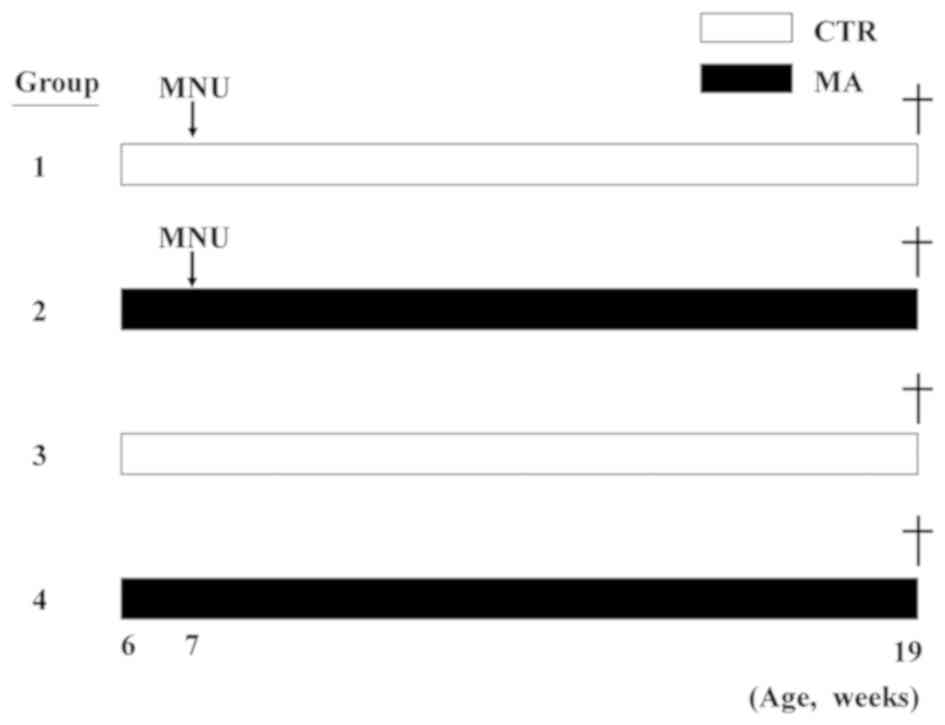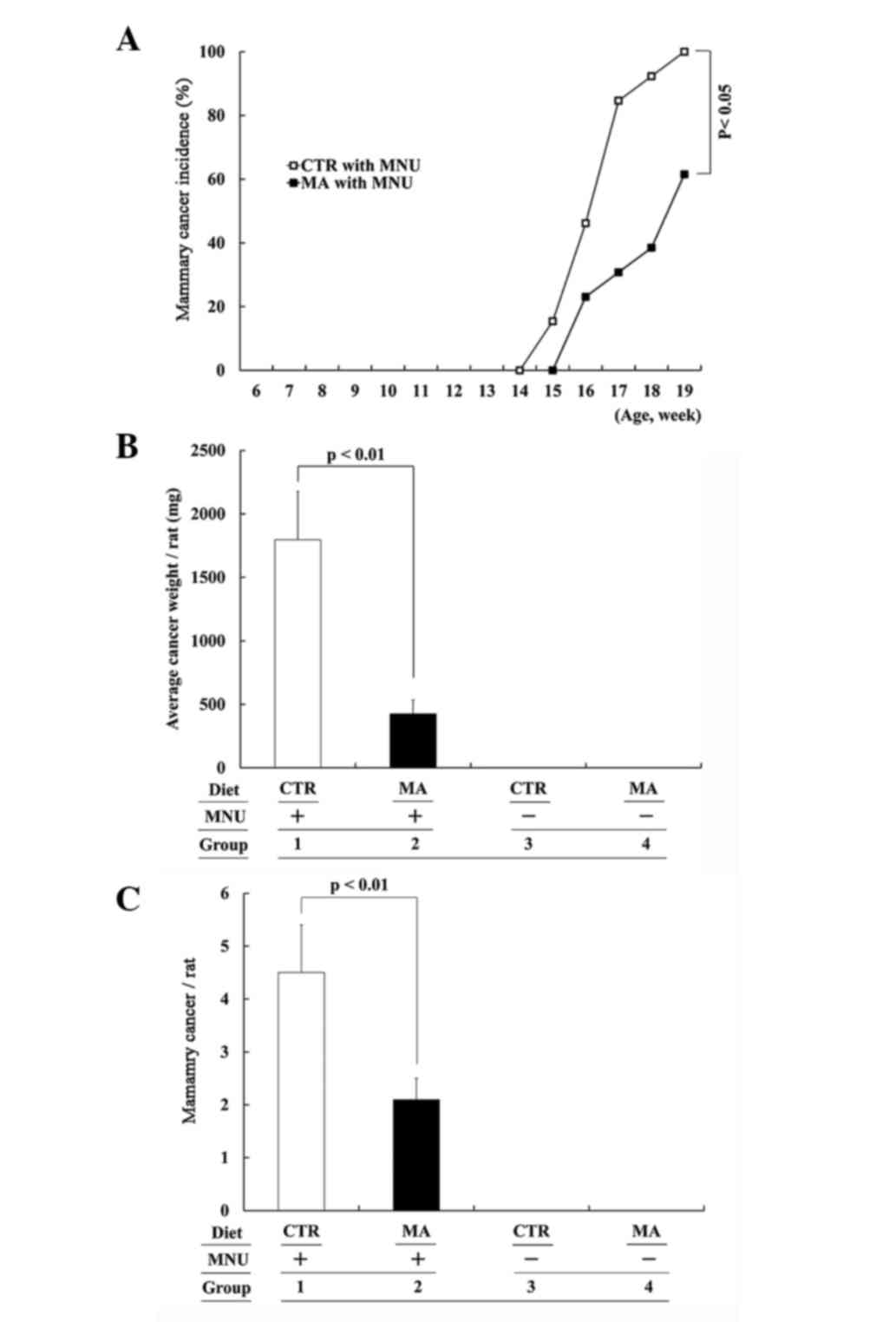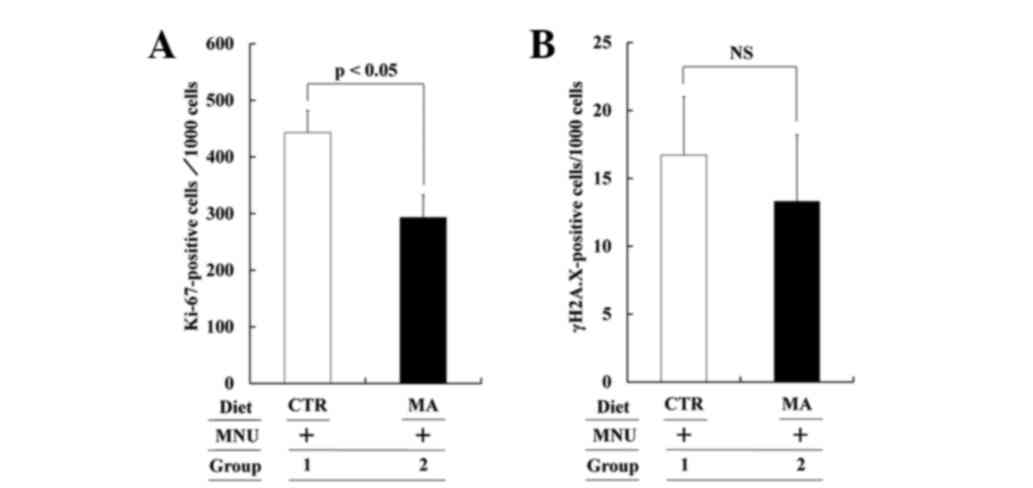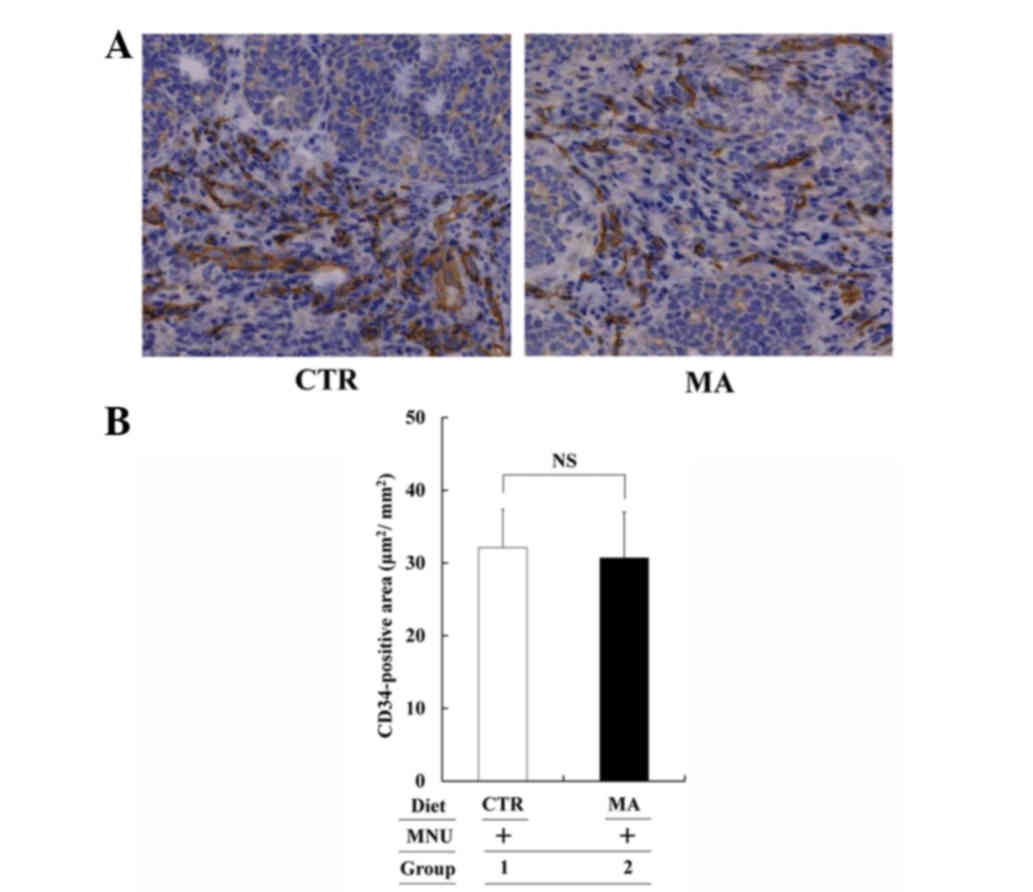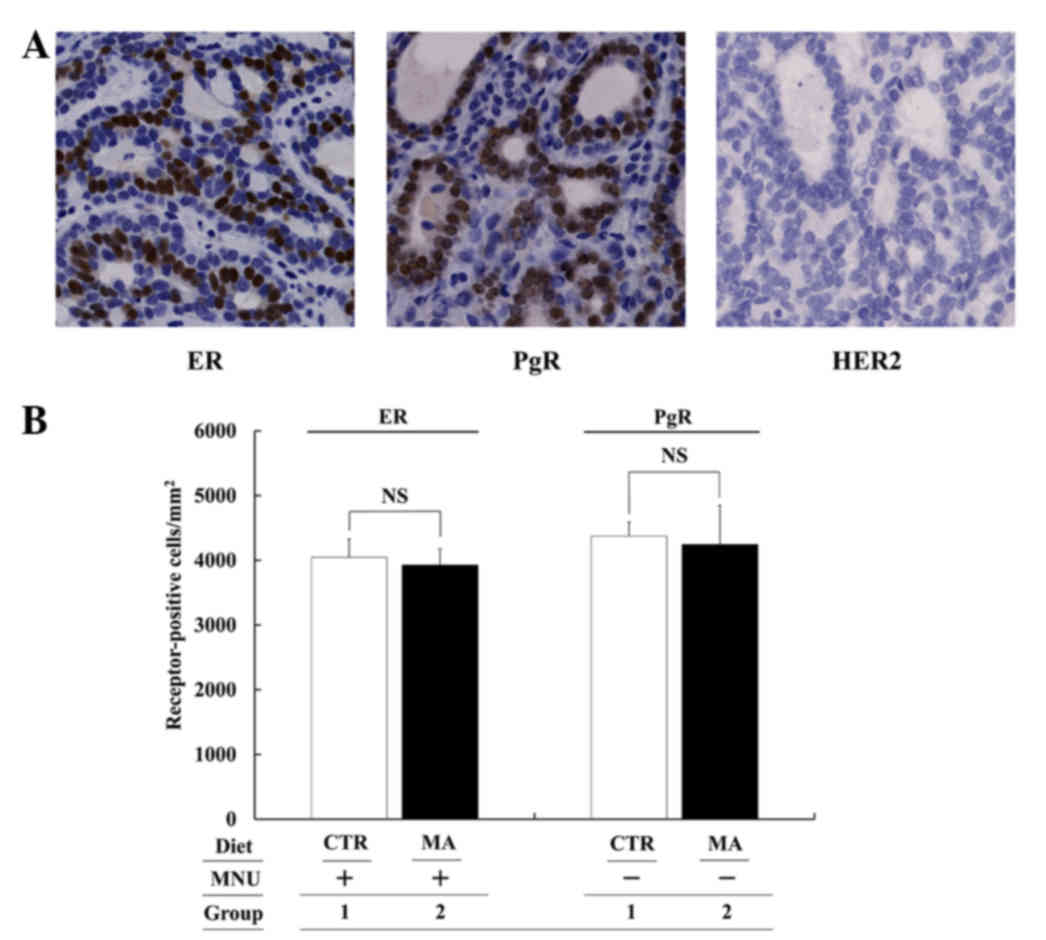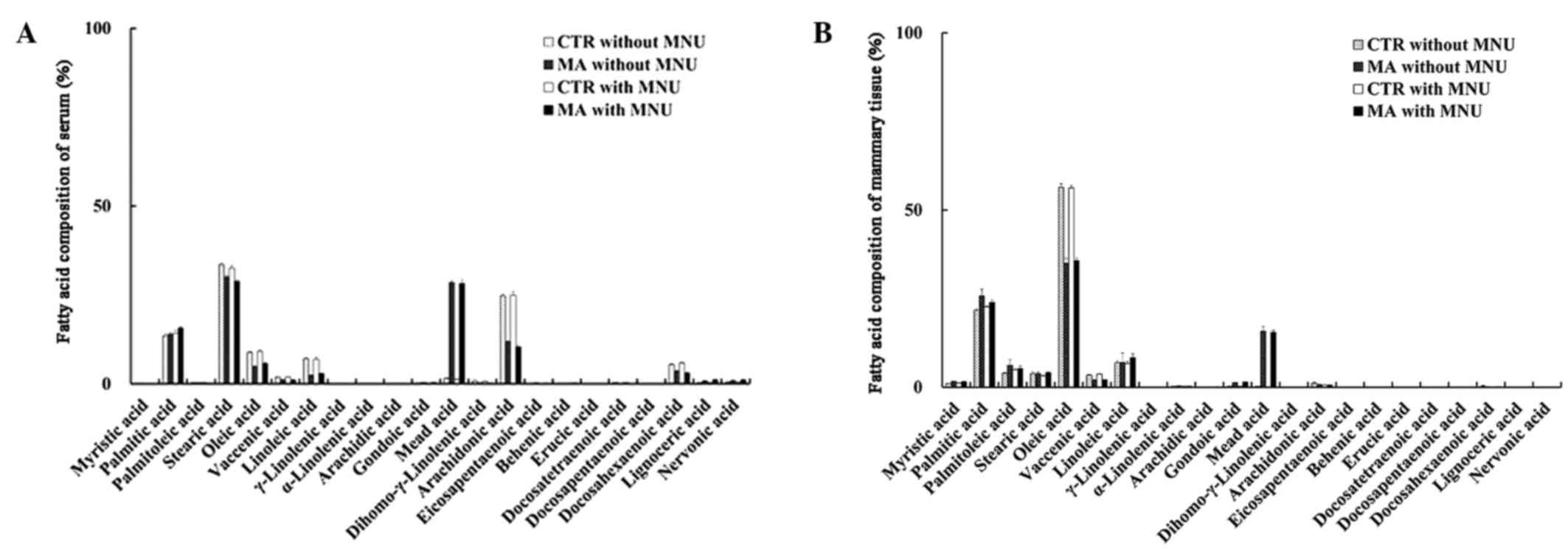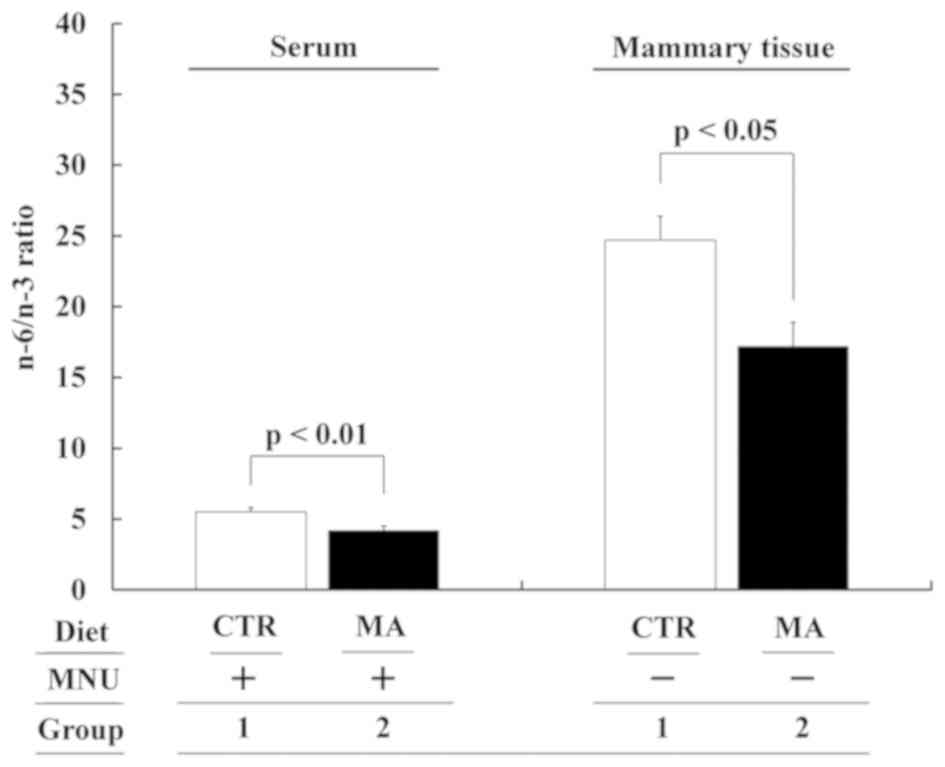|
1
|
Freedman LS, Kipnis V, Schatzkin A and
Potischman N: Methods of epidemiology: Evaluating the fat-breast
cancer hypothesis-comparing dietary instruments and other
developments. Cancer J. 14:69–74. 2002. View Article : Google Scholar
|
|
2
|
Yang B, Ren XL, Fu YQ, Gao JL and Li D:
Ratio of n-3/n-6 PUFAs and risk of breast cancer: A meta-analysis
of 274135 adult females from 11 independent prospective studies.
BMC Cancer. 14:1052014. View Article : Google Scholar : PubMed/NCBI
|
|
3
|
Takata T, Minoura T, Takada H, Sakaguchi
M, Yamamura M, Hioki K and Yamamoto M: Specific inhibitory effect
of dietary eicosapentaenoic acid on N-nitroso-N-methylurea-induced
mammary carcinogenesis in female Sprague-Dawley rats.
Carcinogenesis. 11:2015–2019. 1990. View Article : Google Scholar : PubMed/NCBI
|
|
4
|
Yuri T, Danbara N, Tsujita-Kyutoku M,
Fukunaga K, Takada H, Inoue Y, Hada T and Tsubura A: Dietary
docosahexaenoic acid suppresses N-methyl-N-nitrosourea-induced
mammary carcinogenesis in rats more effectively than
eicosapentaenoic acid. Nutr Cancer. 45:211–217. 2003. View Article : Google Scholar : PubMed/NCBI
|
|
5
|
Cohen LA, Thompson DO, Maeura Y, Choi K,
Blank ME and Rose DP: Dietary fat and mammary cancer. I. Promoting
effects of different dietary fats on N-nitrosomethylurea-induced
rat mammary tumorigenesis. J Natl Cancer Inst. 77:33–42.
1986.PubMed/NCBI
|
|
6
|
Zhu Z, Jiang W, McGinley JN, Prokopczyk B,
Richie JP Jr, El Bayoumy K, Manni A and Thompson HJ: Mammary gland
density predicts the cancer inhibitory activity of the N-3 to N-6
ratio of dietary fat. Cancer Prev Res (Phila). 4:1675–1685. 2011.
View Article : Google Scholar : PubMed/NCBI
|
|
7
|
Senzaki H, Iwamoto S, Ogura E, Kiyozuka Y,
Arita S, Kurebayashi J, Takada H, Hioki K and Tsubura A: Dietary
effects of fatty acids on growth and metastasis of KPL-1 human
breast cancer cells in vivo and in vitro. Anticancer Res.
18:1621–1627. 1998.PubMed/NCBI
|
|
8
|
Chang NW, Wu CT, Chen DR, Yeh CY and Lin
C: High levels of arachidonic acid and peroxisome
proliferator-activated receptor-alpha in breast cancer tissues are
associated with promoting cancer cell proliferation. J Nutr
Biochem. 24:274–281. 2013. View Article : Google Scholar : PubMed/NCBI
|
|
9
|
Trichopoulou A, Lagiou P, Kuper H and
Trichopoulos D: Cancer and Mediterranean dietary traditions. Cancer
Epidemiol Biomarkers Prev. 9:869–873. 2000.PubMed/NCBI
|
|
10
|
Buckland G, Travier N, Agudo A,
Fonseca-Nunes A, Navarro C, Lagiou P, Demetriou C, Amiano P,
Dorronsoro M, Chirlaque MD, et al: Olive oil intake and breast
cancer risk in the Mediterranean countries of the European
prospective investigation into cancer and nutrition study. Int J
Cancer. 131:2465–2469. 2012. View Article : Google Scholar : PubMed/NCBI
|
|
11
|
Rose DP and Connolly JM: Effects of fatty
acids and inhibitors of eicosanoid synthesis on the growth of a
human breast cancer cell line in culture. Cancer Res. 50:7139–7144.
1990.PubMed/NCBI
|
|
12
|
Fulco AJ and Mead JF: Metabolism of
essential fatty acids. VIII. Origin of 5,8,11-eicosatrienoic acid
in the fat-deficient rat. J Biol Chem. 234:1411–1416.
1959.PubMed/NCBI
|
|
13
|
Ichi I, Kono N, Arita Y, Haga S, Arisawa
K, Yamano M, Nagase M, Fujiwara Y and Arai H: Identification of
genes and pathways involved in the synthesis of Mead acid (20:3
n-9), an indicator of essential fatty acid deficiency. Biochim
Biophys Acta. 1841:204–213. 2014. View Article : Google Scholar : PubMed/NCBI
|
|
14
|
Pouchieu C, Chajès V, Laporte F,
Kesse-Guyot E, Galan P, Hercberg S, Latino-Martel P and Touvier M:
Prospective associations between plasma saturated, monounsaturated
and polyunsaturated fatty acids and overall and breast cancer
risk-modulation by antioxidants: A nested case-control study. PLoS
One. 9:e904422014. View Article : Google Scholar : PubMed/NCBI
|
|
15
|
Heyd VL and Eynard AR: Effects of
eicosatrienoic acid (20:3 n-9, Mead's acid) on some
promalignant-related properties of three human cancer cell lines.
Prostaglandins Other Lipid Mediat. 71:177–188. 2003. View Article : Google Scholar : PubMed/NCBI
|
|
16
|
Kinoshita Y, Yoshizawa K, Hamazaki K,
Emoto Y, Yuri T, Yuki M, Shikata N, Kawashima H and Tsubura A: Mead
acid inhibits the growth of KPL-1 human breast cancer cells in
vitro and in vivo. Oncol Rep. 32:1385–1394. 2014.PubMed/NCBI
|
|
17
|
Kurebayashi J, Kanomata N, Moriya T,
Kozuka Y, Watanabe M and Sonoo H: Preferential antitumor effect of
the Src inhibitor dasatinib associated with a decreased proportion
of aldehyde dehydrogenase 1-positive cells in breast cancer cells
of the basal B subtype. BMC Cancer. 10:5682010. View Article : Google Scholar : PubMed/NCBI
|
|
18
|
Sandhu R, Parker JS, Jones WD, Livas CA
and Coleman WB: Microarray-based profiling for molecular
classification of breast cancer and identification of new targets
for therapy. Lab Medicine. 41:364–372. 2010. View Article : Google Scholar
|
|
19
|
Sakuradani E, Kamada N, Hirano Y,
Nishihara M, Kawashima H, Akimoto K, Higashiyama K, Ogawa J and
Shimizu S: Production of 5,8,11-eicosatrienoic acid by a delta5 and
delta6 desaturation activity-enhanced mutant derived from a delta12
desaturation activity-defective mutant of Mortierella alpina 1S-4.
Appl Microbiol Biotechnol. 60:281–287. 2002. View Article : Google Scholar : PubMed/NCBI
|
|
20
|
Kanematsu S, Yoshizawa K, Uehara N, Miki
H, Sasaki T, Kuro M, Lai YC, Kimura A, Yuri T and Tsubura A:
Sulforaphane inhibits the growth of KPL-1 human breast cancer cells
in vitro and suppresses the growth and metastasis of orthotopically
transplanted KPL-1 cells in female athymic mice. Oncol Rep.
26:603–608. 2011.PubMed/NCBI
|
|
21
|
Redon CE, Weyemi U, Parekh PR, Huang D,
Burrell AS and Bonner WM: γ-H2AX and other histone
post-translational modifications in the clinic. Biochim Biophys
Acta. 1819:743–756. 2012. View Article : Google Scholar : PubMed/NCBI
|
|
22
|
Hammond ME, Hayes DF, Dowsett M, Allred
DC, Hagerty KL, Badve S, Fitzgibbons PL, Francis G, Goldstein NS,
Hayes M, et al: American society of clinical oncology/college of
American pathologists guideline recommendations for
immunohistochemical testing of estrogen and progesterone receptors
in breast cancer. J Clin Oncol. 28:2784–2795. 2010. View Article : Google Scholar : PubMed/NCBI
|
|
23
|
Wolff AC, Hammond ME, Hicks DG, Dowsett M,
McShane LM, Allison KH, Allred DC, Bartlett JM, Bilous M,
Fitzgibbons P, et al: Recommendations for human epidermal growth
factor receptor 2 testing in breast cancer: American society of
clinical oncology/college of American pathologists clinical
practice guideline update. J Clin Oncol. 31:3997–4013. 2013.
View Article : Google Scholar : PubMed/NCBI
|
|
24
|
Russo J: Significance of rat mammary
tumors for human risk assessment. Toxicol Pathol. 4:145–170. 2015.
View Article : Google Scholar
|
|
25
|
Bligh EG and Dyer WJ: A rapid method of
total lipid extraction and purification. Can J Biochem Physiol.
37:911–917. 1959. View
Article : Google Scholar : PubMed/NCBI
|
|
26
|
Tsubura A, Uehara N, Kiyozuka Y and
Shikata N: Dietary factors modifying breast cancer risk and
relation to time of intake. J Mammary Gland Biol Neoplasia.
10:87–100. 2005. View Article : Google Scholar : PubMed/NCBI
|
|
27
|
Cazzaniga M and Bonanni B: Breast cancer
chemoprevention: Old and new approaches. J Biomed Biotechnol.
2012:9856202012. View Article : Google Scholar : PubMed/NCBI
|
|
28
|
Hamazaki T, Nagasawa T, Hamazaki K and
Itomura M: Inhibitory effect of 5,8,11-eicosatrienoic acid on
angiogenesis. Prostaglandins Leukot Essent Fatty Acids. 86:221–224.
2012. View Article : Google Scholar : PubMed/NCBI
|
|
29
|
Okuyama H, Kobayashi T and Watanabe S:
Dietary fatty acids-the N-6/N-3 balance and chronic elderly
diseases. Excess linoleic acid and relative N-3 deficiency syndrome
seen in Japan. Prog Lipid Res. 35:409–457. 1996. View Article : Google Scholar : PubMed/NCBI
|
|
30
|
Lips EH, Mulder L, de Ronde JJ, Mandjes
IA, Koolen BB, Wessels LF, Rodenhuis S and Wesseling J: Breast
cancer subtyping by immunohistochemistry and histological grade
outperforms breast cancer intrinsic subtypes in predicting
neoadjuvant chemotherapy response. Breast Cancer Res Treat.
140:63–71. 2013. View Article : Google Scholar : PubMed/NCBI
|
|
31
|
Goldhirsch A, Wood WC, Coates AS, Gelber
RD, Thürlimann B and Senn HJ: Panel members: Strategies for
subtypes-dealing with the diversity of breast cancer: Highlights of
the St. Gallen international expert consensus on the primary
therapy of early breast cancer 2011. Ann Oncol. 22:1736–1747. 2011.
View Article : Google Scholar : PubMed/NCBI
|















